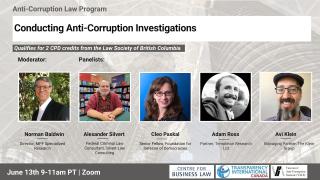The Anti-Corruption Law Program (ACLP) is pleased to announce a webinar on Conducting Anti-Corruption Investigations.
Since 2016, the Anti-Corruption Law Program has been examining the many ways and means of combating corrupt activity, specifically through strengthening existing legislation and policies, and generating greater public awareness.
But these actions often occur after a corrupt act has been detected. So how do we investigate an alleged act of corruption? What are the steps to be taken, and the tools to be used? And more importantly, who are the people who are best able to conduct such time-consuming but invaluable investigations?
Investigations come in all shapes and sizes, including internal (where in-house staff investigate an issue within their own organization), external (conducted by private consultants or law firms), and larger (often criminal) projects conducted by law enforcement. Collectively these investigations can examine a lengthy list of alleged misdeeds, including, but hardly limited to, financial irregularities, hidden assets, bribery and kickbacks, political misconduct, unfair procurement and contracting, and fraud.
The many types of investigations are as varied as the people who conduct them -- private investigators, investigative journalists, compliance officers, IT specialists, regulators, law enforcement, human resources personnel, forensic accountants, in-house counsel, and investigative due diligence professionals. The results of their work can have a massive impact, as they help uphold the principles of transparency, accountability, and justice in our society by preserving institutional integrity, the rule of law, protection of human rights, and the fairness of the markets.
Whether an investigation seeks to reveal corruption, or if corruption is uncovered during an unrelated investigation, the methodologies for both approaches are similar, but with some key differences. If your work involves investigations, or if you simply wish to learn more about investigations in general, please join us on Thursday, June 13 from 9:00-11:00 am PT as we discuss how investigations of alleged corruption can be carried out.
The members of our panel have a wealth of experience in investigating corruption, financial crime, and other illicit acts in a wide variety of jurisdictions, and will be sharing their knowledge of methodologies, the use of OSINT tools, pitfalls to avoid, and case histories.
Moderator:
- Norman Baldwin, Director, MPF Specialized Research
Panel:
- Avi Klein – Managing Partner, The Klein Group
- Cleo Paskal - Senior Fellow, Foundation for Defense of Democracies
- Alexander Silvert – Federal Criminal Law Consultant, Silvert Law Consulting
- Adam Ross - Partner, Templeton Research Ltd.
Avi Klein - Panelist
Avi Klein is a private investigator based in Oakland, California. A former journalist and political “oppo” researcher from a winning presidential campaign, he is a recognized expert in locating and navigating public records. His practice focuses on supporting attorneys in complex civil litigation and related investigative matters. He has a BA from UC Davis and a JD from the University of Southern California.
Cleo Paskal - Panelist
Cleo is a Non-Resident Senior Fellow for the Indo-Pacific at the Foundation for Defense of Democracies, Washington, D.C. She has testified before the U.S. Congress, regularly moderates/lectures for training seminars for the U.S. military and has taught at defense colleges in the United States, United Kingdom, India, Canada and Oman. She is widely published in the academic and popular press and has written for (among many others): The Diplomat, Defense News, Naval War College Review, The Telegraph, South China Morning Post, The Australian, Japan Times, The World Today, National Interest, International Affairs, and is currently a columnist for The Sunday Guardian (India) newspaper.
Alexander Silvert - Panelist
Alexander Silvert was a state and federal public defender for 36 years, retiring in 2020 as First Assistant in the Hawaii Federal Defender Office. In 2000 he was named, with several other recipients, Federal Public Defender of the Year. In 2021 Silvert authored the book, The Mailbox Conspiracy, which detailed how Silvert, in representing his client who was charged with stealing a mailbox, was framed by the Honolulu Chief of Police and his prosecutor wife and led to the greatest public corruption case in Hawaii history.
Adam Ross - Panelist
Adam has been an investigative researcher for nearly 15 years. After cutting his teeth researching corruption and human rights abuses for civil society organizations, he began a career as a corporate investigator in the UK then started his own firm from his kitchen table in Vancouver. He is now a partner at Templeton Research, a due diligence and investigations consultancy he cofounded in 2019. While he can’t talk about most of his projects, some highlights are working as a contract investigator for the Cullen Commission, Peter German’s Dirty Money review, and Transparency International, where he is now on the board of its Canadian chapter.
This webinar is being presented by the Anti-Corruption Law Program (ACLP), which is a joint continuing professional educational initiative of the Centre for Business Law at the Peter A. Allard School of Law at the University of British Columbia (UBC), Transparency International - Canada Chapter, and the Vancouver Anti-Corruption Institute at the International Centre for Criminal Law Reform and Criminal Justice Policy.
- Centre for Business Law
- General Public
- Continuing Professional Development
- Research Talks
